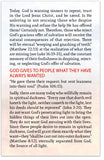Does God Really Send People To Hell?
- Estimated shipping date: Monday, April 29 (Click for more details)
- SKU:
- Format: Folded Gospel Tract
- Paper: Gloss Text
- Size: 3.5" x 5.5"
- Pages: 6
- Versions: KJV, NKJV
Show all item details
The full text of this gospel tract is shown below in the KJV version. (It is also available in NKJV. Select the one you want to order using the “Version” buttons above.)
“A good and loving God will not send any of His creatures to Hell.”
Many people really believe this statement is true and quote it as if it were found in the Bible. Let us consider what the Holy Scriptures actually say about God sending people to the lake of fire.
God Is Good And Loving
The first part of the statement is wonderfully true. God is good (Psalm 100:5; Luke 18:19) and God is love (John 3:16; 1 John 4:8,16). In His love, God has provided us with a way of escape from the punishment our sin deserves. He sent His only begotten Son—Jesus Christ—to die on the cross in our place, enduring sin’s judgment so we can be forgiven.
Through the death and resurrection of Jesus Christ, God has made it possible for every man, woman, and child to be saved from eternal punishment in the lake of fire. This free gift of salvation is received by simply trusting in the Lord Jesus Christ as one’s personal Savior.
Even though God, in His love, has provided the way of salvation, He does not force it upon us. He will not drag people kicking and screaming into Heaven. “He that believeth not the Son shall not see life; but the wrath of God abideth [or remaineth] on him” (John 3:36).
God Allows Man To Reap The Consequences Of His Deeds
“Whatsoever a man soweth, that shall he also reap” (Galatians 6:7). Jacob sowed lying and deceit (Genesis 27:18-29) and reaped the same in return (Genesis 29:15-30). King David committed adultery and murder (2 Samuel 11). But even though he repented of these sins and God forgave him (Psalms 32 and 51), the natural consequences remained. He had trouble in his own family—including adultery and murder—for the rest of his days.
We see the same thing all around us today. Lung cancer, mental impairment, and STDs are a few of the many natural consequences of smoking, alcohol abuse, and illicit sex, respectively. Likewise, people who end up in the lake of fire will be there as a natural consequence of their actions.
Imagine that you see someone trapped in the current, floating down the Niagara River. You call out a warning and throw a rope. If the warning is heeded and the help accepted, that person will be saved. However, the response may also be:
• Unbelief—“You’re joking.”
• Foolishness—“That sounds like fun.”
• Self-reliance—“I can swim to shore.”
• Neglect—“I’m still a long way from the falls.”
Today, God is warning sinners to repent, trust in the Lord Jesus Christ, and be saved. Is He unloving in not rescuing those who despise His warning and refuse the help He has offered them? Certainly not. Therefore, those who reject God’s gracious offer of salvation will receive the natural consequences of that rejection. There will be eternal “weeping and gnashing of teeth” (Matthew 22:13) at the realization of what they are missing (see Luke 16:19-31), and the constant memory of their foolishness in despising, rejecting, or neglecting God’s offer of salvation.
God Gives To People What They Have Always Wanted
“He gave them their request; but sent leanness into their soul” (Psalm 106:15).
Sadly, there are many today who willfully remain in spiritual darkness. “Every one that doeth evil hateth the light, neither cometh to the light, lest his deeds should be reproved” (John 3:20). They do not want God’s penetrating light to bring the hidden things of their lives out into the open. They do not want God messing with their lives. Since these people desire to remain in spiritual darkness, God will grant them exactly what they want—they “shall be cast out into outer darkness” (Matthew 8:12), eternally separated from God, the Source of all light.
“Whosoever drinketh of this water shall thirst again; but whosoever drinketh of the water that I shall give him shall never thirst; but the water that I shall give him shall be in him a well of water springing up into everlasting life” (John 4:13-14). Just as there are many who desire to remain in spiritual darkness, there are many who have no interest in quenching the thirst of their souls with anything but the pleasures of this world. To them, experiencing cleansing, forgiveness, and an eternity of joy through the living water Jesus Christ would be less fulfilling than a life of sin.
Since these people desire to remain thirsty, God will grant them exactly what they want. They will cry out like the rich man Jesus spoke of: “Have mercy on me, and … cool my tongue; for I am tormented in this flame” (Luke 16:24). These people will enter into eternity with no way to satisfy their thirst, and no way to escape God’s judgment.
God’s Punishment Of Man Is No More Severe Than His Punishment Of His Own Son
When the Lord Jesus suffered for our sins on the cross, He experienced spiritual darkness and separation from God (Matthew 27:45-46). He had intense thirst (Psalm 22:15; John 19:28) and cried out in anguish of soul (Psalm 22:1; 69:3,10,20). Would it be fair to the Lord Jesus Christ, after all the suffering He endured to save sinners, for God to save those who despise and reject the way of salvation He provided?
In the story of the rich man mentioned earlier, we do not find one hint that he thought it unfair or unloving of God to have sent him to Hell. He only wanted to warn his five brothers “lest they also come into this place of torment” (Luke 16:28). Dear reader, if you are not yet saved, I appeal to you to heed God’s warning to you and accept His free offer of salvation—TODAY!
Otherwise, you may live forever to regret the day that you despised His warning and refused His offer. “Verily, verily I say unto you, He that heareth My Word, and believeth on Him that sent Me, hath everlasting life, and shall not come into condemnation [judgment]; but is passed from death unto life” (John 5:24). —Paul L. Canner
Testimonials
“I have had such pleasant experiences spreading the good news of God's great love by giving out the "Somebody Loves You" tracts. I walk up to someone who looks sad and lonely and I say, "Did you know somebody loves you?" Their faces brighten, they get a big smile and all...” more
“I am currently an inmate and was given a tract called "Why Did This Happen To Me?" It has helped me to grow stronger in my faith and I put all of my trust in the Lord now. I have read from this tract to other inmates in our little...” more
“When I leave the house, I always grab a handful of Bible tracts. You never know when God will send somebody your way unless you are prepared. I've been sowing seeds for about 50 years.”
“I love your tracts and believe they are a tremendous witnessing tool! Presently, my favorite tract is "Have a Good Day!" As people say, "Have a good day," I respond by handing them this tract and replying, "You have a good day as well, and here is something for you to...” more
“Oh, how thankful I am for your soul winning ministry and for those who are able to support you. I am happy to report that by the time you receive this letter, all of the gospel "seeds" (tracts) that you sent me will have been planted in the large field...” more
“I wanted to acknowledge and appreciate your wonderful heart of love being extended to us here in Africa. It was so wonderful that you sent us timely messages for hungry souls. They are touching many souls and blessing many. My heart is full of thanksgiving when we receive letters of...” more
“We want to thank you for your supply of tracts that we received. Praise God that here we are allowed freedom of worship. Your literature is being distributed freely to churches and individuals who testify that they are blessed by your publications. It's a blessing to join with you in...” more
“Thank you for the gift you sent to me. It was a blessing. You guys always put the joy and love in everything you do. I will share all the tracts with everyone that crosses my path. Let's continue to plant those seeds of salvation by His grace.”
“What a blessing it is to be a part of your ministry. You make sharing the gospel fun, exciting, and efficient!”
“Because of your tracts, I and many other inmates here have turned our lives to Jesus Christ. I cannot tell you enough how much we appreciate the work that you do and the powerful Gospel resources that you send.”
What Is Imprinting?
If you select “add imprinting”, we will personalize this tract for you. You can use the space provided to add up to 5 lines of text. It’s a perfect way to include contact information for your church, ministry, or business!
→ For more information please visit our imprinting help page.

Imprinting Questions
How much does imprinting cost? The imprinting charge is $5 per pack.
How long does it take? Orders of less than 3,000 copies (per title) take about 2-3 business days for printing. Orders of 3,000 or more copies (per title) usually require 2-3 weeks for printing.

Where does my information go? Every tract has a space reserved on the back page for imprinting. A live preview is shown on your screen as you enter your text.
Can I add a logo or image? Yes, you can upload your own custom logo or image and it will be printed in full color. If your logo doesn't look quite right after uploading it, don't worry: all jobs are carefully reviewed before printing and we will custom-fit everything together for you.
Do I have to enter my imprint over and over? If you're logged in to your account, any imprints you create will be saved so you can re-use them with a single click.
→ For more information please visit our imprinting help page.













